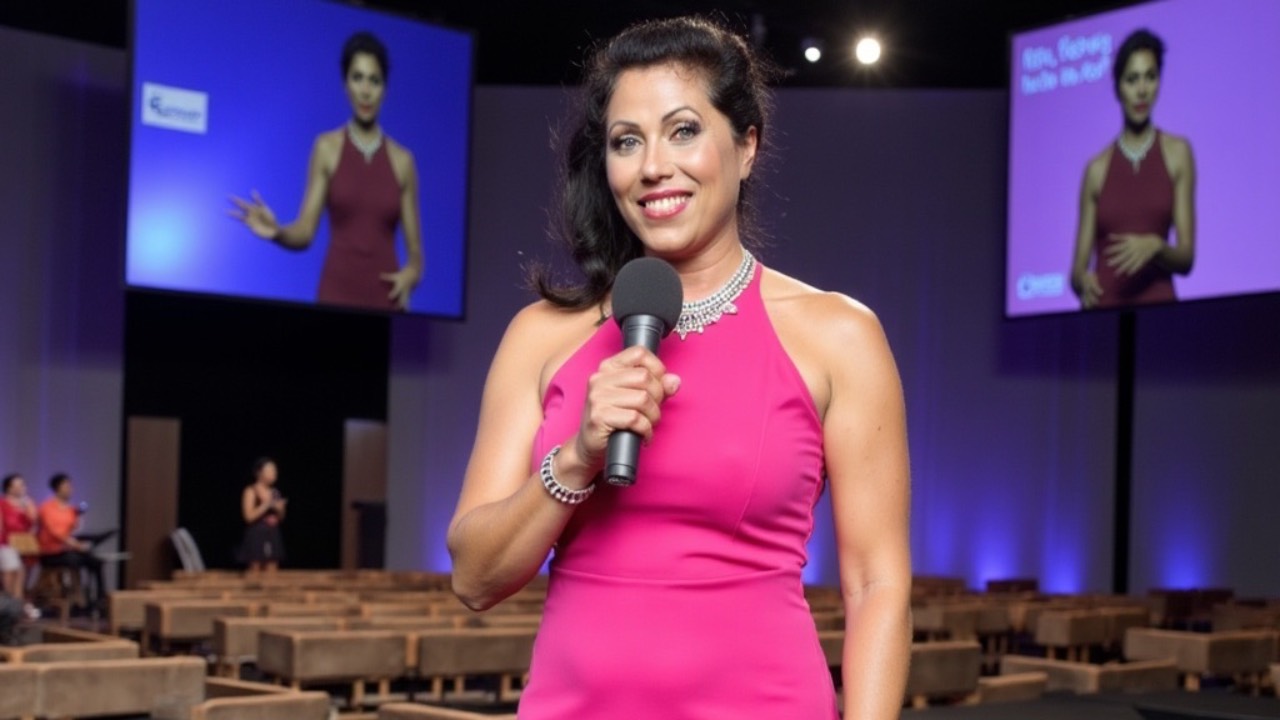A Blog Designed to Help You Become a Better Speaker
Look Good, Feel Great: How Your Wardrobe and Makeup Impact Your Speaking Success

Hey Speaker Friends,
Let’s talk about something that’s hugely underestimated in public speaking: your appearance. Not in a shallow way. I’m talking about how your wardrobe and makeup choices directly affect your confidence, stage presence, and how you're perceived by clients and audiences.
I’ve had multiple meeting planners tell me they hired me in part because of how I dress. This is usually for fundraisers or dinners where they want someone funny, but they want the event to have a nice feel. They didn't want a "comedian" type look.
Fun fact: I’m kind of known for wearing pink dresses and being dressed up. It sounds obvious as a speaker, that you should dress professionally or nice. However, there are aspects that I learned from years of stage and hours with costumers that help me know what visually pops and works in my favor.
1. Your Wardrobe = Your Nonverbal First Impression
Before you say a word, your audience is making snap judgments—and so are the event organizers.
Ward...
What Sets Great Speakers Apart: It's Not Just the Words

I recently emceed an event with a variety of motivational speakers. Some of the content was brilliant—authentic, personal stories delivered with heart. But as I watched from the wings, one thing stood out clearly: a few speakers had something more.
I’ve written about it before, but it remains one of the clearest differentiators on stage.
It’s the “It Factor.”
For years, I’ve tried to define exactly what the “It Factor” is—because audiences feel it, meeting planners want it, and every speaker chases it. While I do believe some people are naturally wired with it, there’s one element that seems to be at the core:
Energy.
Not frantic, nervous energy. Not forced enthusiasm. I’m talking about a deliberate, grounded energy that expands beyond the speaker and fills the entire room. It’s the kind of energy that can carry a story, a song, or a speech—no matter the pace, tone, or emotional range.
And here’s the catch: most speakers unintentionally leak their energy.
When you’re excited or ...
🎭 The Unexpected Power of… an Apple? (Or, Why Props Make Your Speech 10x Better)
When I used to teach acting, my most "challenging" students—the ones who overacted or couldn't quite connect—got a very specific prop from me: food.
Yep. Real food.
Why? Because you can’t fake eat.
When you’ve got a mouth full of chips or a slice of pizza in your hand, you stop performing. You just say the line. And suddenly, it's real. It's grounded. It's human.
I once had a student eat his way through an entire play. And every. Single. Line. Sounded authentic. Why? Because the prop pulled the performance out of him, not the other way around.
And this technique? It works in the speaking world too.
One of the most powerful monologues I ever saw was just a man, a pocket knife, and an apple. He slowly sliced the fruit as he spoke. No theatrics. No gestures. Just... presence.
(Okay, don’t bring a knife on stage—I’m not trying to get you tackled by TSA. 😅)
But the idea stands: A personal prop—something meaningful that connects to your message—can elevate your story instantly.
👉 ...
🎤 Master the Mic: How to Hook Your Audience in 30 Seconds (or Less)

Let’s be real—today’s audiences have the attention span of a caffeinated squirrel. With phones buzzing, brains multitasking, and minds wandering, grabbing your audience's attention isn’t just important—it’s survival. As a speaker, you've got seconds to go from "meh" to "Whoa, tell me more!" So how do you nail that opening moment and keep people leaning in instead of checking out?
Let’s break down the art (and science) of audience engagement—starting with the first 30 seconds.
🔥 Why Your Opening Line Can Make or Break Your Speech
First Impressions Are Everything
Think of your opening as your mic drop moment—only it’s at the start instead of the end. It's your first chance to say, “Hey! This matters. YOU matter. Stick with me.”
A strong hook does three things:
- Grabs attention like a Netflix trailer.
- Builds curiosity about what’s coming next.
- Creates connection so the audience feels like you “get” them.
Fall flat in the first 30 seconds, and it doesn’t matter how b...
If You Think You Are There to Educate An Audience -You're Wrong
The number one most boring speakers are those who think they are teaching us something. They drone on with points, information, graph filled slides and zero thought to the audiences emotional journey.
In acting, there is something called, "The Moment Before". This is a question you ask your self regarding your character the moment they before they come on the stage.
If the character enters the stage and has a line, "Hey, are you in here?" the line can read VERY differently I regards to what happened the moment before.
Here are some examples:
*They just woke up from falling asleep on the lounge chair outside.
*They just ran 10 miles to get home after their car was stolen.
*They just won the lottery.
What happens the moment before makes the same line mean VERY different things.
I like to use this analogy, because your audience has a "moment before" you walk on the stage. They way they are feeling, or what they are thinking is VERY different which means your talk will go VERY dif...
📊 Why Your Slides Should Feel Something—Not Just Say Something
We've all sat through those presentations. You know the ones.
Slide after slide of charts, bar graphs, and statistically significant snooze-fests.
Here’s the thing: data doesn’t move people. Emotions do.
If you're a speaker—whether on a stage, in a boardroom, or pitching to a potential client—your goal isn’t to transfer information. It’s to inspire action. And that happens when your audience feels something.
🔁 Swap Stats for Stories 🖼️ Trade Graphs for Gut Punches 🎯 Use Visuals that Move, Not Just Inform
In the short video above (taken from my course "How to Add Creativity, Humor and Audience Engagement to Your Speech"), I break down exactly how to use emotionally-charged visuals in your slides to create connection—and convert audiences from passive listeners to raving fans. I show some of my ACTUAL slides, as an FYI. (AKA - You'll want to click and watch.)
Let’s break this down:
🔹 Why Stats Often Fail: Numbers don’t stick. What sticks is the emotion behind the message. A...
The Psychology of a Great Speech: How to Move Your Audience to Action

As motivational speakers, our ultimate goal is not just to entertain or inform — it's to inspire action. Whether you're helping an audience navigate uncertainty, embrace change, or overcome personal obstacles, the power of your message lies in its ability to move people into action.
But how do we, as speakers, tap into the psychology of our audience to create lasting impact? The answer lies in understanding the emotional and cognitive responses that drive human behavior.
1. Appeal to Emotion, Not Just Logic
The human brain is wired to respond to emotions before logic. While facts, figures, and logical arguments are important, they don’t move people the way emotions do. Research in neuroscience tells us that people are more likely to take action based on how they feel in the moment, rather than what they think.
As a speaker, your goal should be to create an emotional connection. You want your audience to feel something — whether it's excitement, empathy, or inspiration. When you e...
A Video About Shooting Demo Reels Followed By an Article on How Not to Shoot Video for Demo Reels... 😜
I shot this video to teach about Speaker Demo Reels and hawk my wares.
When I went to trim it, I noticed several things about this video. I thought about NOT posting it because of what I saw. However, I realized there's some valuable lessons in how much the details matter when you are shooting video.
I shot this with a Logitech Brio 4k computer camera, and a Samsung Q2U microphone. I shoot in my bedroom because there are two large windows and the natural light works best. (I do have lights, but I prefer natural if I can use it. Plus, setting up the lights to get them right is such a pain in the rear and I don't want to do it every time I shoot.)
I recorded this on Zoom because I have a pro level account through the National Speaker's Association and it's easy to use.
The video is 10 minutes long and there is a HUGE shift in the lighting. It starts in the bottom corner and you will see the sunlight grow into a big bright spot. Most of the day the sun is behind my house so there is...
Storytelling and Humor Technique Any Speaker Can Use

I’m going to be honest—I don’t think everyone can be funny. We’ve all sat through someone trying to be funny, and it was awkward and painful, like watching a slow-motion car crash. Shoot—I’ve even been awkward and painful at times when trying out a new joke.
But there is one technique I believe anyone can do. And even if it doesn’t make you hilarious, it will at least make your storytelling dramatically more engaging—whether humor is your goal or not.
What’s at Stake?
This is a question actors ask themselves almost immediately when given a role. A story must have conflict in order to be a story. What a character stands to lose or gain shapes how they react—and that’s where the magic happens.
There are different levels of stakes:
- Deep emotional stakes: Love, pride, significance, revenge. (Think: "If I don’t confess my love, I’ll die alone!")
- Medium stakes: Job security, finances, major life changes. ("If I don’t land this job, I’ll have to move back in with my parents.") ...
Why Didn't I Get the Speaking Gig???

You got the rejection email. You were in the running, and THEN they went with someone else. Not only did they go with someone else, but you know that someone else—and you’re a better speaker.
So why did they hire that person instead of you?
Coming from the acting world, I can tell you there are a few reasons you may not have considered as a speaker.
1. Your Marketing Assets Aren’t Good
You can be an amazing speaker, but if you have a boring headshot where you look like everyone else, a so-so demo reel, and an uninteresting talk title, they’ll glaze right over you.
In acting, the headshot is everything. There has to be something that stands out—usually the expression, the eyes, or the colors. The same is true for your photo. If you have the typical boring gray or blue background headshot with your arms crossed in a suit… snooze.
You need something—whether it’s a standout demo reel, humor in your email, or a talk title that makes people do a double take—to get them to look at y...


